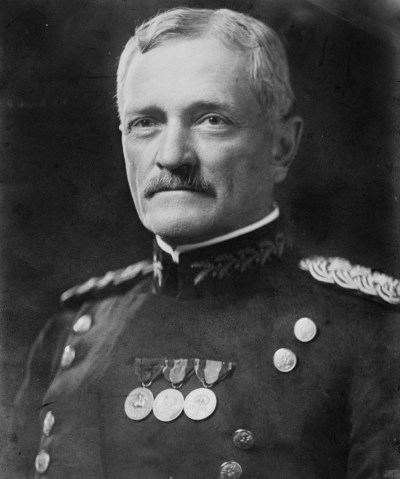The Battle of Belleau Wood (126 June 1918) occurred during the German spring offensive in World War I, near the Marne River in France. The battle was fought between the U.S. 2nd (under the command of Major General Omar Bundy) and 3rd Divisions along with French and British forces against an assortment of German units including elements from the 237th, 10th, 197th, 87th, and 28th Divisions. The battle has become a key component in the lore of the United States Marine Corps.
General of the Armies John Joseph Pershing (September 13, 1860 – July 15, 1948), nicknamed "Black Jack", was a senior United States Army officer. He served most famously as the commander of the American Expeditionary Forces (AEF) on the Western Front during World War I, from 1917 to 1918. In addition to leading the AEF to victory in World War I, Pershing notably served as a mentor to many in the generation of generals who led the United States Army during World War II, including George C. Marshall, Dwight D. Eisenhower, Omar Bradley, Lesley J. McNair, George S. Patton and Douglas MacArthur.During his command in World War I, Pershing rejected British and French demands that American forces be integrated with their armies, essentially as replacement units, and insisted that the AEF would operate as a single unit under his command, although some American divisions fought under British command, notably in the Battle of Hamel and the breaching of the Hindenburg Line at St Quentin Canal, precipitating the final German collapse. Pershing also allowed (at that time segregated) American all-Black units to be integrated with the French Army.
Pershing's soldiers first saw serious battle at Cantigny, Chateau-Thierry, Belleau Wood June 1–26, 1918, and Soissons on July 18–22, 1918. To speed up the arrival of American troops, they embarked for France leaving heavy equipment behind, and used British and French tanks, artillery, airplanes and other munitions. In September 1918 at St. Mihiel, the First Army was directly under Pershing's command; it overwhelmed the salient – the encroachment into Allied territory – that the German Army had held for three years. For the Meuse-Argonne Offensive, Pershing shifted roughly 600,000 American soldiers to the heavily defended forests of the Argonne, keeping his divisions engaged in hard fighting for 47 days, alongside the French. The Allied Hundred Days Offensive, which the Argonne fighting was part of, contributed to Germany calling for an armistice. Pershing was of the opinion that the war should continue and that all of Germany should be occupied in an effort to permanently destroy German militarism.
Pershing is the only American to be promoted in his own lifetime to General of the Armies, the highest possible rank in the United States Army. Allowed to select his own insignia, Pershing chose to continue using four stars. After the creation of the five-star General of the Army rank during World War II, his rank of General of the Armies could unofficially be considered that of a six-star general, but he died before the proposed insignia could be considered and acted upon by Congress.
Some of his tactics have been criticized both by other commanders at the time and by modern historians. His reliance on costly frontal assaults, long after other Allied armies had abandoned such tactics, has been blamed for causing unnecessarily high American casualties. Pershing was also criticized by some historians for his actions on the day of armistice as the commander of the American Expeditionary Force. Pershing did not approve of the armistice, and despite knowing of the imminent ceasefire, he did not tell his commanders to suspend any new offensive actions or assaults in the final few hours of the war. In total, there were over 11,000 casualties, dead, missing, or injured during the final day of the war on November 11, which exceeded even D-Day casualty counts seen later in 1944. Of those, 3,500 were American casualties directly attributable to Pershing's actions. Pershing was later questioned by Congress as to why there were so many American casualties on the final day of the war.

1918Jun, 26
Allied Forces under John J. Pershing and James Harbord defeat Imperial German Forces under Wilhelm, German Crown Prince in the Battle of Belleau Wood.
Choose Another Date
Events on 1918
- 3Mar
World War I
Russia signs the Treaty of Brest-Litovsk, agreeing to withdraw from World War I, and conceding German control of the Baltic States, Belarus and Ukraine. It also conceded Turkish control of Ardahan, Kars and Batumi. - 2May
Chevrolet Motor Company
General Motors acquires the Chevrolet Motor Company of Delaware. - 24Jun
Montreal
First airmail service in Canada from Montreal to Toronto. - 4Jul
Nicholas II of Russia
Bolsheviks kill Tsar Nicholas II of Russia and his family (Julian calendar date). - 9Nov
Wilhelm II, German Emperor
Kaiser Wilhelm II of Germany abdicates after the German Revolution, and Germany is proclaimed a Republic.

 English
English  español
español  français
français  português
português  русский
русский  العربية
العربية  简体中文
简体中文 